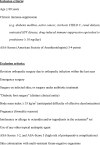General skin and nasal decolonization with octenisan® set before and after elective orthopedic surgery in selected patients at elevated risk for revision surgery and surgical site infections-a single-center, unblinded, superiority, randomized controlled trial (BALGDEC trial)
- PMID: 38978089
- PMCID: PMC11229206
- DOI: 10.1186/s13063-024-08173-y
General skin and nasal decolonization with octenisan® set before and after elective orthopedic surgery in selected patients at elevated risk for revision surgery and surgical site infections-a single-center, unblinded, superiority, randomized controlled trial (BALGDEC trial)
Abstract
Background: The preoperative body surface and nasal decolonization may reduce the risk of surgical site infections (SSI) but yields conflicting results in the current orthopedic literature.
Methods: We perform a single-center, randomized-controlled, superiority trial in favor of the preoperative decolonization using a commercial product (octenidine® set). We will randomize a total number of 1000 adult elective orthopedic patients with a high risk for SSI and/or wound complications (age ≥ 80 years, chronic immune-suppression, American Society of Anesthesiologists score 3-4 points) between a decolonization (octenisan® wash lotion 1 × per day and octenisan® md nasal gel 2-3 × per day; during 5 days) and no decolonization. Decolonized patients will additionally fill a questionnaire regarding the practical difficulties, the completeness, and the adverse events of decolonization. The primary outcomes are SSI and revision surgeries for postoperative wound problems until 6 weeks postoperatively (or 1 year for surgeries with implants or bone). Secondary outcomes are unplanned revision surgeries for non-infectious problems and all adverse events. With 95% event-free surgeries in the decolonization arm versus 90% in the control arm, we formally need 2 × 474 elective orthopedic surgeries included during 2 years.
Discussion: In selected adult orthopedic patients with a high risk for SSI, the presurgical decolonization may reduce postoperative wound problems, including SSI.
Trial registration: ClinicalTrial.gov NCT05647252. Registered on 9 December 2022.
Protocol version: 2 (5 December 2022).
Keywords: Body decolonization; Elective orthopedic surgery; High risk patients; Octenidine; Questionnaire; Randomized controlled trial; Surgical site infections; Wound problems.
© 2024. The Author(s).
Conflict of interest statement
The authors declare no competing interests. The donation of Schülke & Mayr Switzerland has no influence on the study conduct, interpretation, analyses, and publication. Schülke has no access to the anonymized data and will not interfere with the publication of the final results.
Figures
References
-
- Dancer SJ, Christison F, Eslami A, Gregori A, Miller R, Perisamyet K, et al. Is it worth screening elective orthopaedic patients for carriage of Staphylococcus aureus? A part-retrospective case-control study in a Scottish hospital. BMJ Open. 2016;6:011642. doi: 10.1136/bmjopen-2016-011642. - DOI - PMC - PubMed
-
- Global guidelines for the prevention of surgical site infection, second edition. Geneva: World Health Organization; 2018. Licence: CC BY-NC-SA 3.0 IGO https://www.who.int/publications/i/item/global-guidelines-for-the-preven.... - PubMed
-
- Prentice HA, Chan PH, Champsi JH, Clutter DS, Maletis GB, Mohan V, et al. Temporal Trends in deep surgical site infections after six orthopaedic procedures over a 12-year period within a US-based healthcare system. J Am Acad Orthop Surg. 2022;30:1391–1401. doi: 10.5435/JAAOS-D-22-00280. - DOI - PubMed
Publication types
MeSH terms
Substances
Associated data
Grants and funding
LinkOut - more resources
Full Text Sources
Medical



